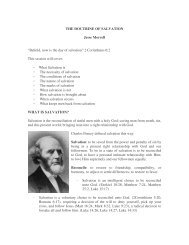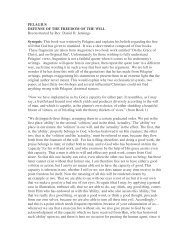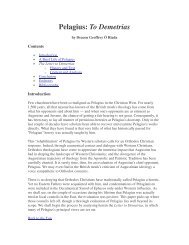Does_God_Take_Away_Free_Will_Jesse_Morrell 2.pdf - PinPoint ...
Does_God_Take_Away_Free_Will_Jesse_Morrell 2.pdf - PinPoint ...
Does_God_Take_Away_Free_Will_Jesse_Morrell 2.pdf - PinPoint ...
Create successful ePaper yourself
Turn your PDF publications into a flip-book with our unique Google optimized e-Paper software.
promoted by the infliction of the legal penalty upon all sinners."<br />
Gordon C. Olson (The Truth Shall Make You <strong>Free</strong>, Published by<br />
Bible Research Corp, p. 100)<br />
"The death of Christ is not a substituted penalty, but a<br />
substitute for a penalty. The necessity of an atonement is not found<br />
in the fact that the justice of <strong>God</strong> requires an invariable execution<br />
of deserved penalty, but in the fact that the honor and glory of<br />
<strong>God</strong>, and the welfare of his creatures, require that his essential and<br />
rectoral righteousness be adequately declared. The death of Christ<br />
is exponential of divine justice, and is a satisfaction in that sense,<br />
and not in the sense that it is, as of a debt, the full and complete<br />
payment of all its demands." John Miley (The Governmental<br />
Theory of the Atonement, p. 9)<br />
“Atonement is, properly, an arrangement by which the<br />
literal infliction of the penalty due to sin may be avoided; it is<br />
something which may be substituted in the place of punishment. It<br />
is that which will answer the same end secured by the literal<br />
infliction of the penalty of the law… The atonement is the<br />
governmental provision for the forgiveness of sins, providing man<br />
meets the conditions of repentance and faith towards our Lord<br />
Jesus Christ.” Harry Conn (Four Trojan Horses, Published by Mott<br />
Media, p. 80-81)<br />
“It [the atonement] provides a substitute for the penalty of<br />
the law”. Winkie Pratney (Youth Aflame, The Nature of Sin,<br />
Published by Communication Foundation Publishers)<br />
WHAT KILLED JESUS?<br />
JESUS DIED OF A BROKEN HEART<br />
“The atonement of Christ was to consist in our blessed<br />
Lord taking the sins of the whole world into His holy heart and<br />
reliving the awfulness in His mind until His human strength<br />
overcome in unspeakable agony… He died of a broken or ruptured<br />
heart and not from the crucifixion, as evidenced by the blood and<br />
water which came from His side when pierced by the soldier (Jn.<br />
19. 32-35).” Gordon Olson (The Kindness of <strong>God</strong> Our Savior,<br />
Published by Revival Theology Promotions, p. 94, 96)<br />
“Jesus took the sins of the whole world deep into His heart<br />
and mind, the anguish of His soul reached unbearable<br />
proportions…He did not die of crucifixion, but rather from internal<br />
agony of His soul… He died as a result of a voluntary<br />
identification, the sin of the world crushing out His life.” George<br />
Otis Jr. (The <strong>God</strong> They Never Knew, Published by Mott Media, p.<br />
124, 126)<br />
THE ATONEMENT RECONCILES JUSTICE AND MERCY<br />
“Through the shedding of blood, <strong>God</strong> was just by<br />
discouraging sin, and merciful by forgiving freely… The fact that<br />
<strong>God</strong> sent Jesus Christ to the Cross is an awesome revelation of two<br />
aspects of His character. It shows us His love while it upholds His<br />
justice because sin is discouraged. We can now understand why<br />
<strong>God</strong> instituted the practice of shedding blood to illustrate that sin is<br />
horrible… The Cross also demonstrates <strong>God</strong>’s determination to<br />
find a way to be merciful.” Ross Tooley (We Cannot But Tell,<br />
Published by OMF Literature Inc, p. 99-100)<br />
“The Cross reconnects the smashed relationship of man and<br />
<strong>God</strong>. He can now forgive because His only begotten Son provided<br />
the great Substitute. The agony of the worst torture in history wrote<br />
<strong>God</strong>'s grief and hatred for sin in letters of blood. To see the cross<br />
both upholds the law and forgives the repentant sinner.” Winkie<br />
Pratney (Youth Aflame, The Nature of Sin, Published by<br />
Communication Foundation Publishers)<br />
“The Divine law has been broken; the interests of the<br />
universe demanded that its righteousness should be maintained,<br />
therefore, its penalty must be endured by the transgressor, or, in<br />
lieu of this, such compensation must be rendered as would satisfy<br />
the claims of justice, and render it expedient for <strong>God</strong> to pardon the<br />
guilty… Christ made such a sacrifice as to render it possible for<br />
<strong>God</strong> to be just, and yet to pardon the sinner.” Catherine Booth<br />
(Popular Christianity, Published by Convention Bookstore, p. 30)


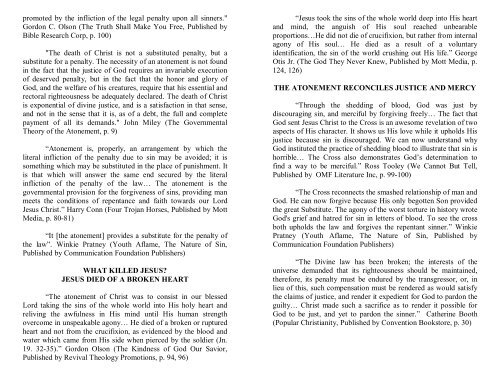

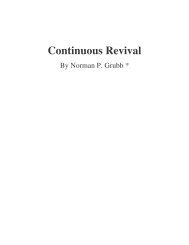
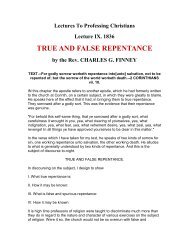
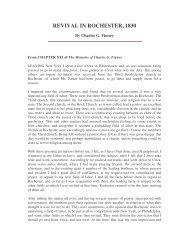

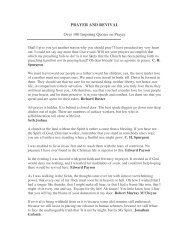
![[PDF] SIX DAYS OR MILLIONS OF YEARS? - Answers in Genesis](https://img.yumpu.com/34887318/1/190x245/pdf-six-days-or-millions-of-years-answers-in-genesis.jpg?quality=85)




